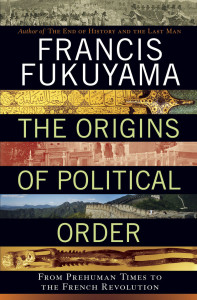Politics
Farrar, Straus and Giroux
2011
 When contemplating books on politics to read which I knew I would disagree with, international studies heavyweight Francis Fukuyama was someone I considered but briefly. Somewhere along the way I’d received the impression that Fukuyama had softened in his views and become somewhat more leftist later in life. Having read the first of this recently completed mammoth duology, I’m left wondering if perhaps the centre has just gravitated right and left him behind.
When contemplating books on politics to read which I knew I would disagree with, international studies heavyweight Francis Fukuyama was someone I considered but briefly. Somewhere along the way I’d received the impression that Fukuyama had softened in his views and become somewhat more leftist later in life. Having read the first of this recently completed mammoth duology, I’m left wondering if perhaps the centre has just gravitated right and left him behind.
The Origins of Political Order is an ambitious attempt at understanding how and why human societies have developed such diverse political structures. The question Fukuyama seeks to answer over all is, why do some societies form state-bound structures, particularly democratic ones, and why do others remain tribal? It’s a question that many historians, philosophers and various other theorists have attempted to tackle in the past and there is a proliferation of theory on the matter; Fukuyama’s take combines a number of those approaches with his own views.
Fukuyama identifies a serious shortfalling in most of the theories of legal and political development that predominate in western thought. That is, most of them are heavily Eurocentric. Some do not even look beyond the industrialised regions of Great Britain, France and Germany, and focus on moulding the development of other polities into models based on analysis of British or French history. Since most of the world isn’t Europe*, it should be fairly obvious why this model fails at the first hurdle. Fukuyama focuses not just on European polities, but also on China and India of antiquity, and then on the Berber and Ottoman empires. Using this broad focus, I think he achieves a better understanding of global human societies than some of the other theorists he discusses.
In this context, it is quite irritating that Fukuyama entirely ignores Africa. Indeed, he uses it as a byword for poverty and corruption through much of the text. He also mostly ignores the Americas, which presumably will change in the second volume, Political Order and Political Decay. The latter is understandable at least to the extent that most of the social structures existing in the Americas before colonisation were thoroughly destroyed, though there is some evidence available as to what forms those societies took in the centuries before European contact. There is also evidence of vast empires and kingdoms that formed at various times across the African continent, including Sub-Saharan Africa. Even if such polities were based on tribal organisation, Fukuyama’s dismissal of the entire continent is unnecessary and contributes to the incorrect, even racist, view that African societies are unchanged, homogenous, and have not developed since the stone age. Perhaps this will be remedied somewhat in the second book, but given the sweeping generalisations present in this one, I’m not holding out much hope.
Amongst Fukuyama’s more grating generalisations is also an apparently uncritical acceptance of idea that the subjugation of women inhers in human (and other primate) societies. Women’s rights are discussed in the book as a freak of modern democracy, and the only major woman political figure given any attention at all is the depraved Empress Wu. Perhaps I’m reading different archeological articles and texts to Mr Fukuyama, but in my view it’s hugely inaccurate to say that women have been subjugated in all societies throughout history, or that tribal societies are necessarily misogynistic ones with strictly defined gender roles.
Fukuyama notes at the beginning of the piece that he is not an expert in archeology or some areas of history. And of course, such an ambitious book does need to make some generalisations. However, the most frustrating part about some of them is how easily they could be remedied. A few words less or more would have done the trick in most instances that annoyed me. There are also several points at which the book comes close to romanticising colonialism; it certainly sanitises it.
With all that said, the breadth and depth of Fukuyama’s studies into the various polities he elected to focus on is obvious. His critiques of various theories of social development are interesting, and Fukuyama’s broad conclusions in formlating his own theory are persuasive. Taking into account the combined roles of biology, environment, religion and other elements , Fukuyama strikes a good balance between biological and environmental determinism. While I may not agree completely with every point he makes, or all of his reasoning, I was certainly compelled by them.
The writing itself is concise and lively, and targeted at an audience with familiarity with political concepts and prominent philosophers. For that reason, it’s probably not for everyone, but as it is a piece of popular non-fiction, it shouldn’t prove prohibitive to those with a basic understanding of those concepts. It certainly is worth a read, albeit taken with a grain of dirty left-wing salt. And now onto the next…**
*European influence is another kettle of fish, which I assume will be taken up in the next book.
**Well, after a short break to read some fiction first.

